
Defense, intelligence, and IT solutions provider CACI International (NYSE:CACI) announced better-than-expected revenue in Q3 CY2024, with sales up 11.2% year on year to $2.06 billion. The company’s full-year revenue guidance of $8.2 billion at the midpoint also came in 1.7% above analysts’ estimates. Its non-GAAP profit of $5.93 per share was also 17.7% above analysts’ consensus estimates.
Is now the time to buy CACI? Find out by accessing our full research report, it’s free.
CACI (CACI) Q3 CY2024 Highlights:
- Revenue: $2.06 billion vs analyst estimates of $1.92 billion (7% beat)
- Adjusted EPS: $5.93 vs analyst estimates of $5.04 (17.7% beat)
- EBITDA: $215.9 million vs analyst estimates of $194.9 million (10.8% beat)
- The company lifted its revenue guidance for the full year to $8.2 billion at the midpoint from $8 billion, a 2.5% increase
- Management raised its full-year Adjusted EPS guidance to $23.34 at the midpoint, a 2% increase
- Gross Margin (GAAP): 8.7%, down from 31.2% in the same quarter last year
- Operating Margin: 8.7%, up from 7.4% in the same quarter last year
- EBITDA Margin: 10.5%, up from 9.4% in the same quarter last year
- Free Cash Flow Margin: 2.4%, similar to the same quarter last year
- Backlog: $32.4 billion at quarter end, up 21.3% year on year
- Market Capitalization: $11.67 billion
“In the first quarter, CACI delivered exceptional financial results across the board with revenue growth of 11%, healthy profitability and cash flow, and strong awards and backlog. In addition, we demonstrated our flexible and opportunistic approach to capital deployment by announcing two strategic acquisitions, Azure Summit Technology and Applied Insight,” said John Mengucci, CACI President and Chief Executive Officer.
Company Overview
Founded to commercialize SIMSCRIPT, CACI International (NYSE:CACI) offers defense, intelligence, and IT solutions to support national security and government transformation efforts.
Defense Contractors
Defense contractors typically require technical expertise and government clearance. Companies in this sector can also enjoy long-term contracts with government bodies, leading to more predictable revenues. Combined, these factors create high barriers to entry and can lead to limited competition. Lately, geopolitical tensions–whether it be Russia’s invasion of Ukraine or China’s aggression towards Taiwan–highlight the need for defense spending. On the other hand, demand for these products can ebb and flow with defense budgets and even who is president, as different administrations can have vastly different ideas of how to allocate federal funds.
Sales Growth
A company’s long-term performance can indicate its business quality. Any business can put up a good quarter or two, but many enduring ones grow for years. Over the last five years, CACI grew its sales at a decent 8.7% compounded annual growth rate. This shows it was successful in expanding, a useful starting point for our analysis.
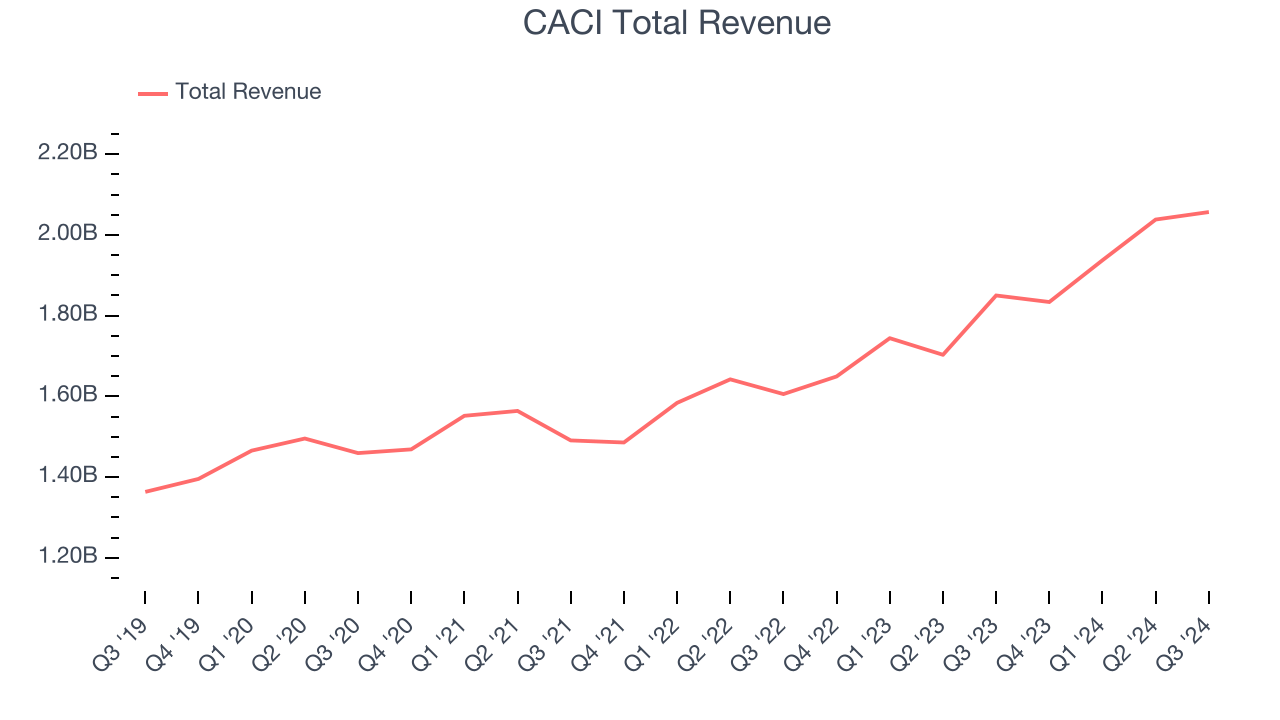
We at StockStory place the most emphasis on long-term growth, but within industrials, a half-decade historical view may miss cycles, industry trends, or a company capitalizing on catalysts such as a new contract win or a successful product line. CACI’s annualized revenue growth of 11.6% over the last two years is above its five-year trend, suggesting its demand recently accelerated.
We can better understand the company’s revenue dynamics by analyzing its backlog, or the value of its outstanding orders that have not yet been executed or delivered. CACI’s backlog reached $32.4 billion in the latest quarter and averaged 11.7% year-on-year growth over the last two years. Because this number is in line with its revenue growth, we can see the company effectively balanced its new order intake and fulfillment processes. 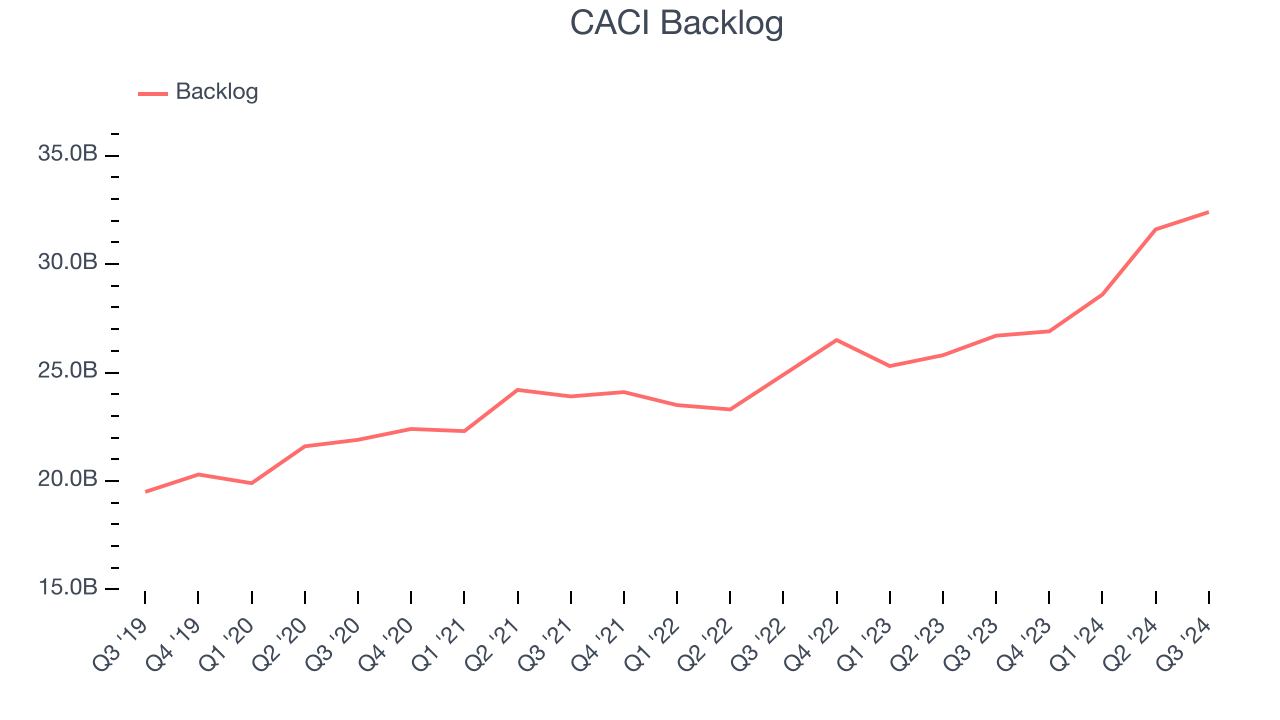
This quarter, CACI reported year-on-year revenue growth of 11.2%, and its $2.06 billion of revenue exceeded Wall Street’s estimates by 7%.
Looking ahead, sell-side analysts expect revenue to grow 3.8% over the next 12 months, a deceleration versus the last two years. This projection is underwhelming and shows the market thinks its products and services will face some demand challenges.
Unless you’ve been living under a rock, it should be obvious by now that generative AI is going to have a huge impact on how large corporations do business. While Nvidia and AMD are trading close to all-time highs, we prefer a lesser-known (but still profitable) semiconductor stock benefitting from the rise of AI. Click here to access our free report on our favorite semiconductor growth story.
Operating Margin
Operating margin is an important measure of profitability as it shows the portion of revenue left after accounting for all core expenses–everything from the cost of goods sold to advertising and wages. It’s also useful for comparing profitability across companies with different levels of debt and tax rates because it excludes interest and taxes.
CACI has done a decent job managing its cost base over the last five years. The company has produced an average operating margin of 8.4%, higher than the broader industrials sector.
Analyzing the trend in its profitability, CACI’s annual operating margin might have seen some fluctuations but has generally stayed the same over the last five years. Shareholders will want to see CACI grow its margin in the future.
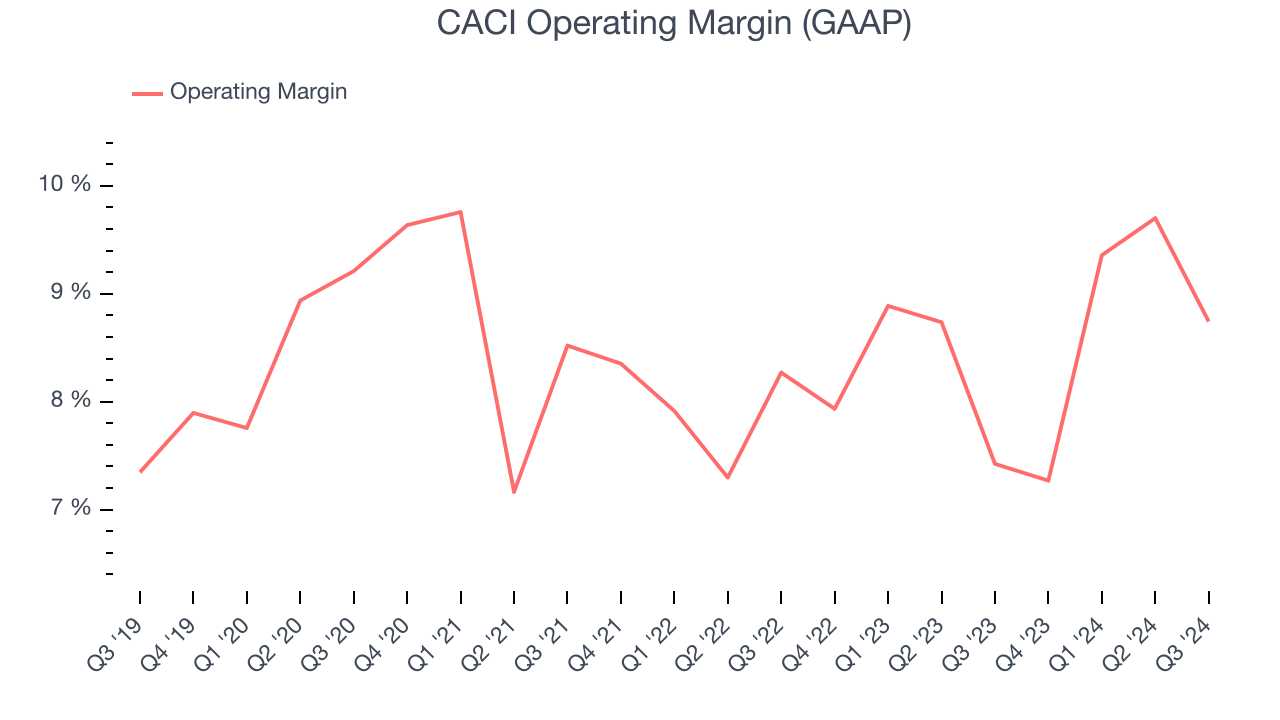
This quarter, CACI generated an operating profit margin of 8.7%, up 1.3 percentage points year on year. This increase was a welcome development and shows it was recently more efficient because its expenses grew slower than its revenue.
Earnings Per Share
Analyzing long-term revenue trends tells us about a company’s historical growth, but the long-term change in its earnings per share (EPS) points to the profitability of that growth – for example, a company could inflate its sales through excessive spending on advertising and promotions.
CACI’s EPS grew at a remarkable 14.5% compounded annual growth rate over the last five years, higher than its 8.7% annualized revenue growth. However, this alone doesn’t tell us much about its day-to-day operations because its operating margin didn’t expand.
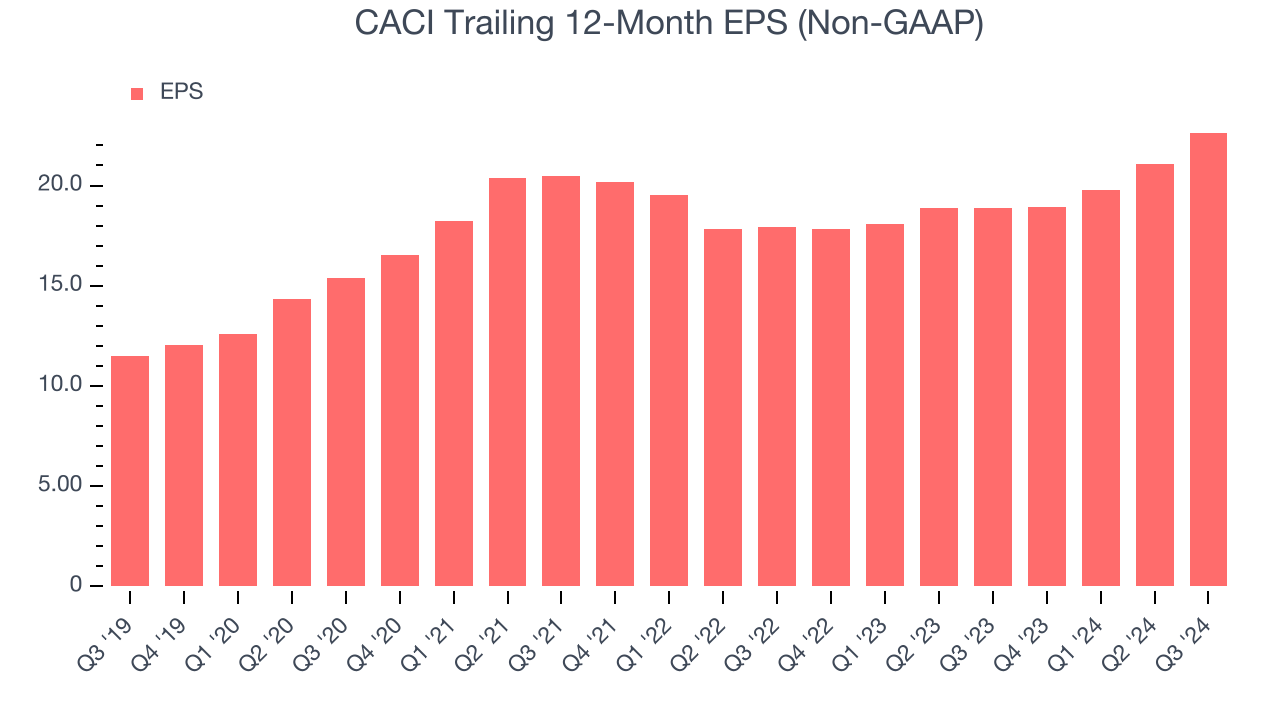
We can take a deeper look into CACI’s earnings to better understand the drivers of its performance. A five-year view shows that CACI has repurchased its stock, shrinking its share count by 11.7%. This tells us its EPS outperformed its revenue not because of increased operational efficiency but financial engineering, as buybacks boost per share earnings. 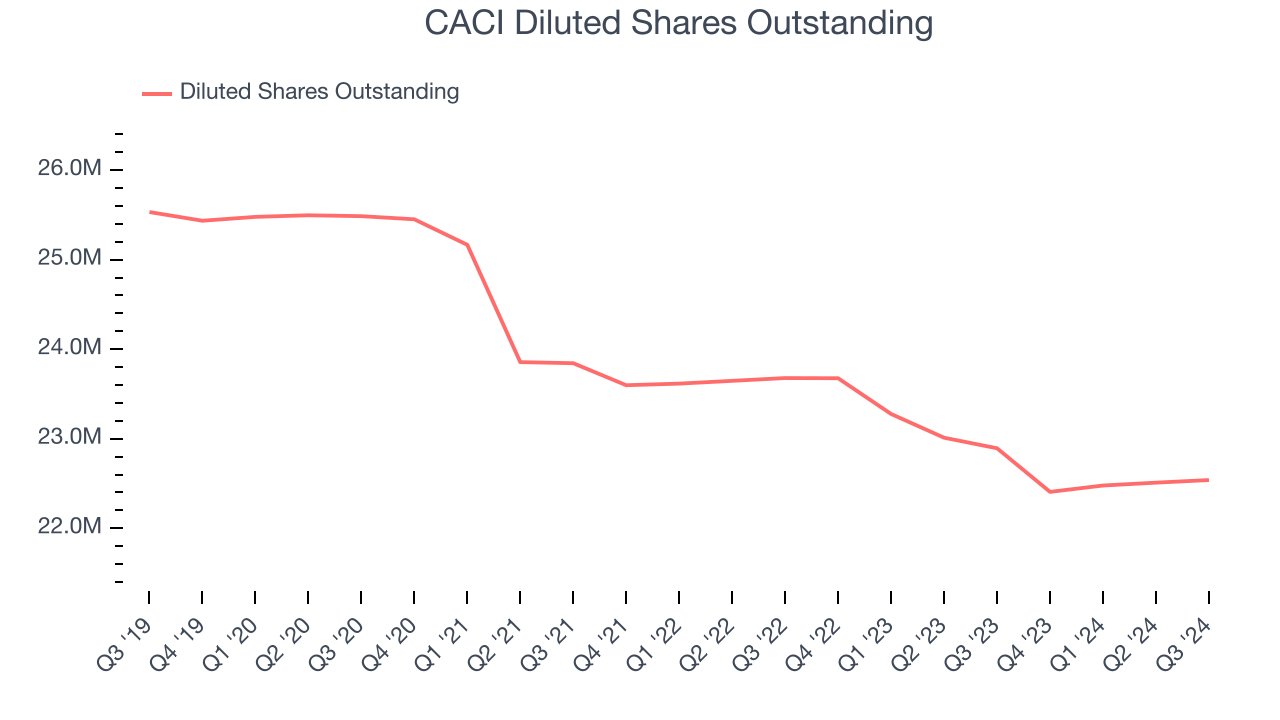
Like with revenue, we analyze EPS over a shorter period to see if we are missing a change in the business. For CACI, its two-year annual EPS growth of 12.4% was lower than its five-year trend. We still think its growth was good and hope it can accelerate in the future.
In Q3, CACI reported EPS at $5.93, up from $4.36 in the same quarter last year. This print easily cleared analysts’ estimates, and shareholders should be content with the results. Over the next 12 months, Wall Street expects CACI’s full-year EPS of $22.64 to grow by 6.6%.
Key Takeaways from CACI’s Q3 Results
We were impressed by how significantly CACI blew past analysts’ backlog expectations this quarter. We were also excited its EBITDA outperformed Wall Street’s estimates. Zooming out, we think this quarter featured some important positives. The stock traded up 3.9% to $545 immediately following the results.
Sure, CACI had a solid quarter, but if we look at the bigger picture, is this stock a buy?The latest quarter does matter, but not nearly as much as longer-term fundamentals and valuation, when deciding if the stock is a buy. We cover that in our actionable full research report which you can read here, it’s free.












